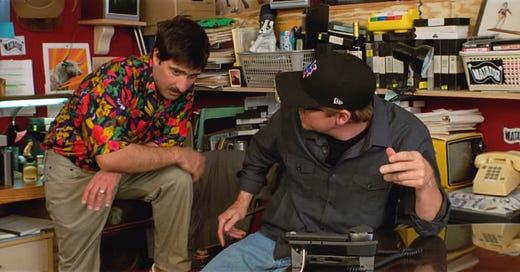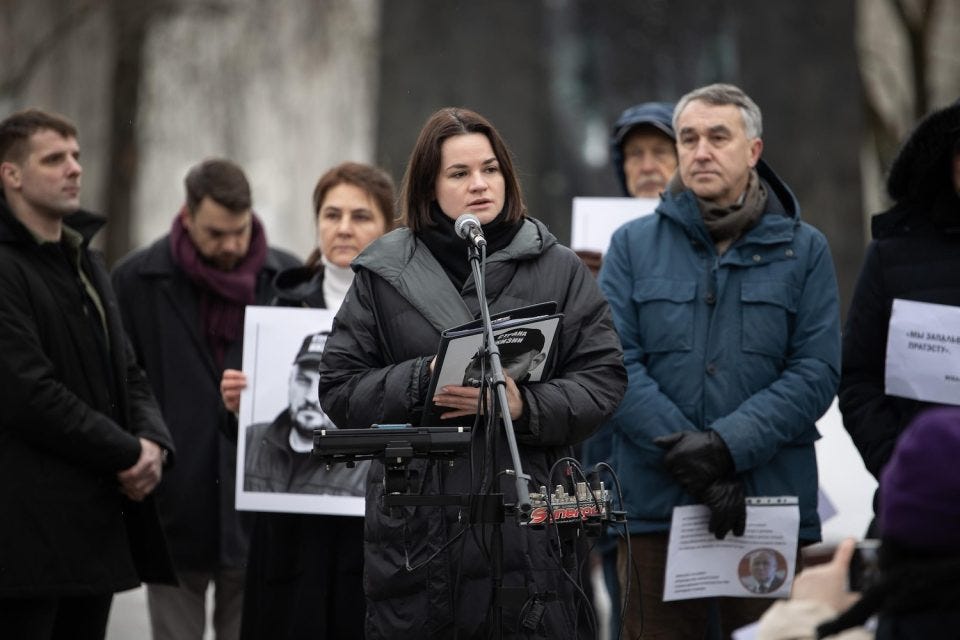"Our goal was to embody the feeling of music" — Pavements Interview with Alex Ross Perry and Robert Greene
+ An Unorthodox Presidential Portrait
By Patrick Fey
In 2019, the people of Matador Records reached out to Alex Ross Perry for a documentary on the cult favourite band Pavement, one of the label’s stalwarts. That was also the year the indie rock’s long-enduring best-kept secret observed its 30th anniversary. In hindsight, we can only speculate if the label representatives could have anticipated the lengths to which Perry was going to celebrate the band’s legacy. Meanwhile, with their unforeseen (and perhaps unprecedented) popularity among TikTok users, propelling the former B-side single “Harness Your Hopes” (1999) to newfound virality, the timing could hardly have been better.
In a triad of its own, Perry, not long after work on Her Smell (2018) had come to a close, began outlining a chaptered three-part structure that soon turned into a much looser hybrid documentary. The Brooklyn-based auteur not only went into the private archives of band lead Stephen Malkmus but also directed a facetiously silly biopic, choreographed a stage musical and organised a pop-up Pavement museum in Lower Manhattan’s Tribeca, featuring memorabilia amassed over the band’s decades-spanning career.
Not all the artefacts displayed in the weekend-long exhibition were authentic, just as “Slanted! Enchanted! A Pavement Musical” and the biopic “Range Life” did not exist outside Perry’s superordinate project. However, accepting Perry’s very own directive — “If Pavement doesn’t have a museum or a musical, but we make them, and they are public events that thousands of people witness, doesn’t it become real?” — it’s worth pondering whether there are some higher truths out there that are only to be found in the artifice in which we present ourselves to the world.
At Venice, we talked to Perry and his editor Robert Greene about finding the right structure for his hybrid documentary Pavements (2024), the notion of directorial control and the newfound, manifold joys arising from the collaborative process.
One of the things I was most curious about was the way you approached structuring the film. How did that emerge?
Alex Ross Perry: The Mishima: A Life in Four Chapters1 (Paul Schrader, 1985) approach was there originally. You take this artist about whom you can’t just tell one story. You have to do this approach, and that movie is chaptered. I originally felt that that’s kind of the correct structure.
Robert Greene: I forgot why we abandoned that. We were just like: “That’s not gonna work?”
ARP: Yeah, it’s this sort of thing that chapters work on paper, which is to say in a book. We basically abandoned it without even trying it because it’s just asking too much of people when you’re playing as many games as we are.
RG: So we decided just to toss that idea up like a salad and mix it up together.
ARP: Stuff like that just doesn’t work, because what you run up against is what you would see in omnibus films. It’s like: “Well, I really liked the first segment and then the second segment was terrible.” So by the third segment, I’m no longer humming. And that’s just part and parcel with something. We didn’t have to do that.
Was there ever a time when you conceived of the script or the final execution as even more blurry than it is now? Because, in that respect, you don’t confuse the audience too much and make clear which parts take place behind the scenes and which ones are scripted. Was there ever a version in which you try to make the lines more seamless?
ARP: No.
RG: We did screen a version of the full “Range Life” biopic to an audience who had a pretty good reaction to the humour and comedy in it and understood the irony. And even though it was somewhat explained, it sometimes goes sideways so quickly that you can’t really trace the source of how it went sideways. But it does.
And it’s basically because they’re just normal people and they’re not run like a business, not run like a machine at all. They’re just guys who made a band that happens to be, you know, my favourite band — and many people’s favourite band! But then they watched the thing, and they were just like: “Wait, what is this?” And I remember Alex being like: “I told them literally every bit of this.”
But it’s still weird to watch yourself in that context. To see things that you don’t even remember or things you didn’t like about how you were covered being parodied. And that was a weird thing. But that reaction — which you see in the film and which is very genuine — when our bass guitarist Mark Ibold says: “I don’t know what this is, and I’m wondering what the reaction to this is gonna be like.” He’s being very much like: “What the hell was this?” That reaction actually helped us figure out what to do with that biopic. We needed to cut through it. We needed to use it in the way the band uses irony and sincerity in their music. We needed to use the “Range Life” biopic as the ironic note next to the sincere note and let that go back and forth.
ARP: Basically, you’re parodying a genre that is bad. You write very cliché scenes with very cliché scenarios and very cliché dialogue. You shoot them very traditionally in a totally uninteresting way. The way all these movies were: “Surprise, surprise, none of those scenes are compelling for four minutes,” which is to say that you’ve nailed it, but then you just dissect what you’re doing.
And thankfully the DP, Robert Kolodny, and Robert Greene found this method on their other collaborations, where they’re like: “While shooting these biopic scenes, there are just other cameras rolling.” Like the scene with Joe Carey and Jason Schwartzman on the stairs, there’s another 30 seconds of that. But what becomes more interesting is this other camera I didn’t even know we had on, where I come in. And Jason says: “Do you think anything like this ever happened?” And I’m like: “No, nothing like this ever happened.”
And that’s a more interesting moment than playing out the rest of this ridiculous scene. It‘s very fortunate that we had it and that’s the way we wanted the movie to be. The process is more interesting than the end result because Pavement are fascinating, and Malkmus is a fascinating figure. But the music is not fascinating. The music is good, right?
RG: Well I think it’s fascinating!
ARP: I mean, it’s fascinating because of how it’s made. If you just played it for someone devoid of context, they’d be like: “It’s good.”
RG: I mean, it’s not like listening to E-L-R2 or something where you’re like: “How did they make that?” But I do think that there’s something in the music where it feels like it’s a put-on, it feels like it’s a reference and it feels like it’s trying to be pop and it feels like it’s resisting being pop and then it feels a little bit like, “Fuck you.”
And I think it’s difficult to make a film that embodies music because, in a way, cinema is an art form that has all the elements, but music is the purest, and that’s why these bad biopics have taken root, right? Because I can’t embody the sound of Tom Waits or Sonic Youth or Nirvana. I can’t really make you feel like it feels to listen to the music. So, I gotta tell this dramatic arc story with actors doing impressions like Bob Dylan or whatever. And I think that our goal was actually to try to embody the feeling of music. Because it is cerebral in one sense and a lot of feeling in another.
Read the rest over at Journey Into Cinema
The Accidental President. Strength Through Vulnerability.
By Redmond Bacon
Kino Krokodil, Berlin, October 15th, Special Screening
Vulnerability is not typically seen as a strength in politics. To be a leader, conventional wisdom states, one must project capability, willingness, decisiveness.
But Sviatlana Tikhanovskaya, the unlikely leader of the Belarusian opposition, thrust into the spotlight after taking over from her imprisoned husband, is all vulnerability, unwillingness and indecisiveness — caught multiple times with her head in her hands, openly doubting her capabilities to lead Belarus into a fair and free future.
This very vulnerability is what makes The Accidental President (Mike Lerner, Martin Herring, 2024) — from the outset an activist doc — such a fascinating portrait of the resistance leader. Far less polished and media-ready than Alexei Navalny in his eponymous anti-Putin documentary (Daniel Roher, 2022), I’d argue that Tikhanovskaya’s lack of political training is exactly what endears her to be the next democratic leader of the country. This vulnerability, far from her undoing, is actually her biggest asset, a clear rebuke to the macho poison of fascist dictator Victor Lukashenko.
Through a mixture of on-the-ground footage and pulled newsreels, The Accidental President covers the stolen August 2020 election and its brutal aftermath, including the mass imprisonment of protestors and her team’s exile in Vilnius, showing how Tikhanovskaya became so crucial to the nation’s new identity while advocating for more exposure and pressure from the West.
This special screening at Kino Krokodil, organised by the Friedrich Ebert Foundation, and part of Tikhanovskaya’s recent visit to Berlin, culminating in her presence at a post-screening Q&A, highlights the very political and urgent nature of the film, telling the world not to forget Belarus as four years since the stolen election has somehow rolled by.
Read the rest over at Journey Into Cinema





